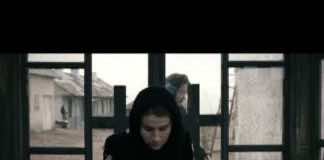
Throughout much of The Ballad of Buster Scruggs, one wonders what these episodic stories about ill-fated or ill-behaved denizens of Manifest Destiny have in common. Then, during the final episode, one loner offers a unique and rather humorous observation about people that can either be seen as a funny, throwaway line or an astute note about everything that came before it. For this writer, it was a crystallizing moment about the savage nature of humanity that the Coen Brothers have built their legacy on.
The opening episode, “The Ballad of Buster Scruggs,” features a grand view of the Red Rocks of Nevada. Someone is singing a beautiful melody, as if immaculately captured in a recording studio. Then, a white dot starts to come into focus. It takes a while to see him, as if the Coens don’t want the audience to lose sight of the majesty of nature. Then, as the camera finally closes in enough, we meet Buster Scruggs (Tim Blake Nelson), dressed in white from hat to boot, strumming a polished black guitar with white trim while loping along on a white horse. This marks the second singing cowboy in a row in a Coen Brothers movie (Hail, Caesar! relentlessly sends up old Hollywood studio system — a film review), but now the filmmakers get to really toy with the notion of the elegance of such a character.

Turns out Buster is a wanted man who has been labeled “The Misanthrope.” Speaking directly to the camera while holding up his WANTED DEAD OR ALIVE poster, he says, “I don’t think I’ve earned that.” On the surface it seems to stir up sympathy from the viewer. However, as we will come to learn, it’s actually a statement steeped in irony. Once again, Joel and Ethan Coen are taking no prisoners in a dark journey of American culture. As pretty and polished as they present The Old West in the film, which will be broken up into six episodes on Netflix while playing as a full feature in some theaters (unfortunately none near Miami) there’s indeed a darkness underneath it all.
Speaking of Netflix, The West has always presented itself as something grand to see on the big screen. Through the lens of Bruno Delbonnel, the sibling filmmakers offer sights of natural beauty — from deserts to forests to prairies — that beg a big screen experience. The unbroken theatrical experience, which cuts nothing from the Netflix version, also helps to gain a wide ranging perspective of these stories featuring protagonists who don’t always fare so well in the wilds of the 19th Century American frontier. This allows for an impressive cast, including James Franco as a bank robber in “Near Algodones” who seems to have run out of luck and Liam Neeson as a travelling impresario in “Meal Ticket” whose freak show is a quadruple amputee (Harry Melling) who delivers dramatic monologues.

There is a varied framework to the episodes, Neeson’s and Melling’s episode hardly features any dialogue, and the two never seem to talk to one another. Their distance makes their deal all the more tragic, not to mention the tale’s grim finale, which offers a ghastly statement on the consumption of art that seems very relevant to today’s state of popular culture (let’s see how this movie fares at the box office compared to watching it with whatever interruption you like at home). The longest episode, “The Gal Who Got Rattled,” features Zoe Kazan as Alice Longabaugh, a woman treated as a business transaction by her feckless brother Gilbert (Jefferson Mays), as he takes her on a wagon train to engage someone who might invest in his business plan. Fate, of course, has other plans, and it’s a delight to watch it waffle between hopeful and positive to cruel and banal in a manner that only the Coens can pull off.
All the performers are high game to banter off the brothers’ dialogue, even when they are lonely gold prospectors in the lush green open spaces (Tom Waits who also gets a few wonderful moments to sing in “All Gold Canyon”) or a motley crew of travelers cramped into a wagon who reveal the dramatic situations that brought them together while also revealing various philosophies to excuse their own existences in this harsh, dark land. It’s the lonely mountain man, however, who gets that line that brings illuminating perspective to the whole terrible shebang: “People are like ferrets. Or beaver. One pretty much like the next.” After all, there are no snowflakes in the dry, hot West.
The Ballad of Buster Scruggs runs 132 minutes and is rated R. It opens exclusively at select Landmark Theaters (not in the Coral Gables one however) on Friday, Nov. 16. For theatrical screenings in your part of the U.S., it’s best to see if you have a Landmark near you and check with them. Netflix invited us to a preview screening at our local Landmark for the purpose of this review.









